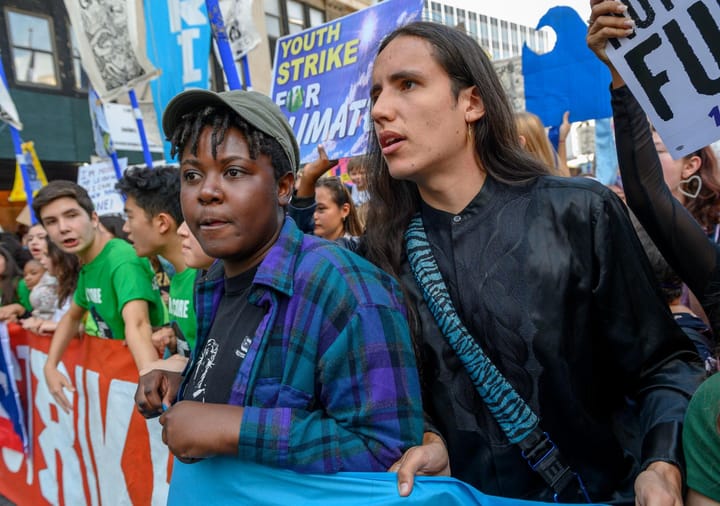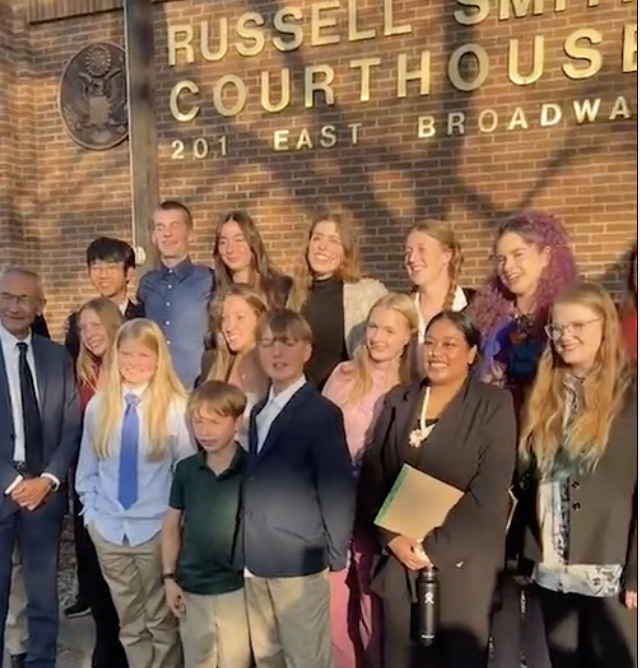Big Oil May Finally Have To Face Trial In Climate Deception Lawsuits. Why It Matters - And What Comes Next

ExxonMobil, Chevron, Shell, and other major oil and gas companies could, within the next couple of years, be put on trial in the US for allegedly sowing doubt about climate change and exacerbating costly climate damages, according to several climate law experts who have closely tracked the ongoing municipal and state litigation against oil companies. This litigation got a significant boost last week when the US Supreme Court declined to review a 2023 decision from Hawaii’s top court allowing a climate tort case brought by Honolulu to advance toward trial. Oil company defendants, led by Sunoco LP and Shell, had petitioned the Supreme Court last year to take up the case in an attempt to block the more than two dozen climate liability lawsuits pending against Big Oil in courts around the country.
On January 13, the Supreme Court denied the companies’ petitions. There were no indications of dissenting justices, though Justice Samuel Alito did recuse himself from consideration of the matter. The decision means that Honolulu’s lawsuit can move ahead, but in the bigger picture it also keeps similar cases in other jurisdictions from being stalled and potentially from being shut down altogether, at least for now.
Denise Antolini, emeritus professor of environmental law at the University of Hawaii, said the oil companies’ petitions “could have been fatal” had the Supreme Court granted them and then ruled in their favor. The fact that the court declined to intervene, she said, is “a huge step forward, a huge obstacle that’s been removed.” While the decision technically only applies to Honolulu’s case, Antolini noted that it “has major implications for all [of] the climate deception cases.”
Over 30 of these cases are currently winding their way through the courts on the path towards trial. Cities, counties, states, and Tribal governments have sued big oil companies in recent years, as climate-related costs pile up and as evidence that the fossil fuel industry knew its products would cause potentially “catastrophic” harm mounts. The lawsuits aim to hold fossil fuel companies liable for allegedly deceiving the public about these risks, which, government plaintiffs say, hampered a swifter transition away from dirty energy and worsened what may have otherwise been manageable climate change impacts like flooding and tropical storms. Some of the cases seek to recover substantial costs to help pay for climate adaptation and disaster response, while others attempt to impose penalties and force the companies to issue corrective statements to remedy violations of state consumer protection laws.
A 2019 lawsuit brought by the state of Massachusetts against ExxonMobil under the state’s consumer protection statute is already in pre-trial discovery – the evidence gathering phase – and could get to trial within the next few years. That lawsuit accuses Exxon of misleading consumers about the climate risks of its products.
The Honolulu lawsuit, filed in March 2020 against a handful of oil and gas companies, is the other case that is furthest along procedurally, and appears to be the most advanced out of the climate tort cases. The case will be entering full discovery now that the Supreme Court has allowed it to proceed.
“It really is the leader of the pack right now,” Antolini said. She predicted that a trial could take place by the end of 2026.
Patrick Parenteau, emeritus professor of law and senior fellow for climate policy at Vermont Law and Graduate School, said the Supreme Court’s ruling clears the path, for now, for the lawsuits to proceed to trial, and that in the Honolulu case, “trial in 2026 is possible.”
Industry Expected to Keep Fighting at Every Turn
But legal experts say there is still a long way to go in this litigation and that they expect the fossil fuel industry and its allies will continue to fight the advance of these cases at every turn.
“It is inevitable that oil companies will somewhere, somehow, be put on trial. But there’s still a long way to go,” James May, distinguished professor of environmental law at Washburn University, told Climate in the Courts. He said the new Trump administration will likely “get involved to the extent that it can, will try to create obstacles for these cases going forward.”
While the federal executive branch cannot really block state court cases from proceeding, the oil companies could potentially file another US Supreme Court petition in another climate liability case. Should that happen and the court again requests a brief from the US Solicitor General, it would be the Trump Justice Department weighing in, and that brief would almost certainly be favorable to the industry’s position.
“The [oil company] defendants may try another cert petition at any time,” Parenteau said. But, he said, they “most likely will wait for a final judgment in the first case to cross the finish line.”
The oil companies could also potentially look to Congress, which has a slim Republican majority, in an attempt to kill the lawsuits. “There may be a possibility of federal legislation that aims to explicitly preempt these types of claims in state court,” said Korey Silverman-Roati, senior fellow at the Sabin Center for Climate Change Law at Columbia University.
Antolini concurred that Congress could be an area to watch in terms of backlash that tries to shield the oil and gas industry from facing accountability through the courts. “Big Oil is not going to give up,” she said. “They have tremendous resources and huge profits in order to maintain a scorched earth fight in all venues.”
Part of that fight involves deploying allies and surrogates to amplify Big Oil’s defensive arguments and messaging on the litigation and to even go on offense. Right-wing allies of the industry linked to conservative billionaire Leonard Leo exerted a media blitz and pressure campaign last year in an effort to convince the Supreme Court to intervene in the Honolulu case. At the same time, a group of 19 Republican-led states, spearheaded by Alabama, petitioned the Supreme Court with a proposed lawsuit targeting California and several other Democrat-led states that are suing Big Oil over climate deception and damages. That petition echoes the oil companies’ arguments that the suits impermissibly seek to regulate interstate greenhouse gas emissions and set national energy policy. The Supreme Court is scheduled to address the petition at conference on Friday and could issue a decision on it next week.
Robert Percival, an environmental law professor at the University of Maryland, called the Alabama et al. petition the “most outlandish of all” and said he expects the Supreme Court will reject it. “It doesn’t have a legal leg to stand on,” he said.
“They’re getting increasingly desperate,” Percival said of the oil company defendants that have seen courts reject most of their legal arguments and procedural bids to block the cases from advancing.
“The oil companies really want to avoid a trial because it will expose a lot of the nefarious things they’ve been doing,” Percival added.
Why a Trial Matters
Now, however, it appears such an evasion may not happen with the Supreme Court’s decision last week not to intervene.
“It is certainly more likely now that at least one of these cases will get to trial,” Silverman-Roati said. “It’s possible within the next couple of years we could see a trial happen.”
And that, legal experts say, would be a very big deal, especially when it comes to accountability for powerful industries alleged to have engaged in deceptive conduct.
“A trial is one of the most powerful ways to get to the truth,” Antolini said. “It is one of those rare occasions where powerful entities are held accountable in a public setting.”
“Trials can be a really illuminating process for the public, especially when you’re talking about historically deceptive behavior,” said Silverman-Roati. “We’ve seen examples of that with the tobacco and opioid cases where, maybe the public has a little bit of an understanding that these companies weren’t totally above-board in their actions, but a trial or a judicial process can be really illuminating in educating the public about decades of deceptive behavior that led to extreme harms.”
For the companies, it is not only potentially billions of dollars that are on the line in these climate liability cases, but their public standing and reputations. “A trial questioning or laying out the evidence of their deceptive behavior over decades could be really damaging to them reputationally,” Silverman-Roati said. “I think that’s part of the motivation of why they’re fighting so hard.”
What Happens Next?
The Honolulu lawsuit could see a trial date scheduled, or at least a schedule laid out for the discovery process, during a case management conference slated to happen next month. A similar lawsuit filed by Maui is also expected to move forward in state court.
In Colorado, a case filed by the city and county of Boulder is currently pending before the Colorado Supreme Court as oil companies seek to reverse a trial court ruling rejecting their motions to dismiss. Oral argument is scheduled for next month at the state supreme court.
Several cases brought by states are advancing, including the Massachusetts case against Exxon and a similar consumer protection case brought by Vermont against several big oil companies. The Vermont case has survived defendants’ motions to dismiss, but defendants are appealing to the Vermont Supreme Court.
Oil companies have succeeded in getting a couple of cases tossed out, including one filed by Baltimore and another brought by New York City. The ruling in the New York City case, granting defendants’ motions to dismiss, came just last week. The City is likely to appeal, and Baltimore has already appealed.
Other cases are at various procedural stages, and there may continue to be mixed judicial rulings on the motions to dismiss, some in favor of plaintiffs and others in favor of defendants. There are also likely to be additional cases filed, such as an expected case from the state of Michigan and possibly one from the state of Hawaii.
“It’s not an accident that the first of these cases were filed not long after Trump was inaugurated the first time,” Silverman-Roati told Climate in the Courts. “I think as levers for holding fossil fuel producers accountable are closed at the federal level, I think advocates will look to other means of holding them accountable, and the judiciary is one.”


